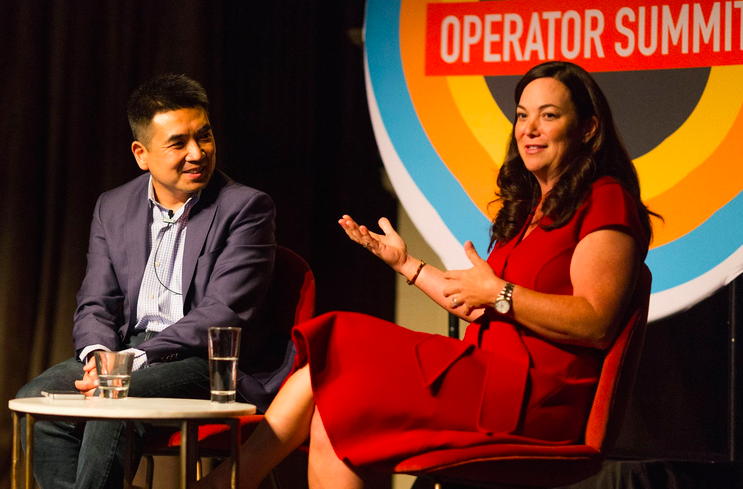Mallun Yen’s latest endeavor, Operator Collective, launched its first summit bringing together operators of high growth venture backed companies.

As a writer focused on female founders and executives, I was invited to cover the event. Yen noticed that the venture world tends to revolve around founders and VCs. Yet her experience as an early team member at RPX and a co-founder at SaaStr is that COOs and operators are critical but do not spend time connecting.
Subscribe to the Crunchbase Daily
For Gusto COO Lexi Reese, “the real challenge of being an operator is you’re working all the time and your life is an empty plate that’s generally filled with — I work, I take care of my family, I see my friends, hopefully, and that’s kind of it.”
Before Operator Summit, there were no events focused on operators, or bringing operators of venture backed companies together in a way that is accessible and comfortable. A group of operators recognized there was a need, and came together to make this happen.
The 200-person summit was kept intentionally small. Attendees nominated others earlier in their career, and outside of these networks, who would benefit from career learnings.
For Yen, “operators are the leaders who build, grow, and run companies. They include c-suite executives, founders, and others who have the operational excellence needed to create enduring companies. They span all functions — from sales and marketing to product and engineering to finance, people, and beyond.”
But given the lack of attention given to operators in the space, it would be useful for us to define what, exactly, an operator compromises of in the C-Suite.
So what do COOs do?
For Stripe exec Claire Hughes Johnson, the COO is a cultural steward, but also a balancing force. Founders are ambitious. They push the envelope. The COO can be a stabilizer, addressing the things founders want to achieve, and the organizational impact. When it comes to leadership teams, if the right people are in the room, and you get those people talking, it’s going to be powerful.
For Hughes Johnson the fire drills never stop. For a fast growing company with offices around the world, the main issues that come up are organizational leadership succession, or people crises. You get the wrong leader, and your culture goes sideways. And you are many time zones away from this experience. How do you get in there and get the right people in the right spots to stabilize that. People think of a COO as being good at operations. But the job is more about how to keep a healthy organization, while you go through all this.

Growing into the CRO role
When interviewed for sales leadership roles, with a 17 year sales career at Oracle, Erica Schultz was often asked if she was “tough enough”? Fast forward and Schultz joined New Relic in April 2014 to build out enterprise sales. At that time the company was still private, with around 300 people and $50 million in revenue. Its business was driven from a ton of digital marketing, with developers from small and medium sized businesses buying directly from their website.
One of New Relics mantras is that “enterprise is a company sport.” Everyone has to operate a little differently when you get into the enterprise.
“You’re much more in a relationship with your individual enterprise

customers. So that’s an important mindset shift,” said Schultz who was promoted to CRO over a year ago. New Relics’ marketing mix changed dramatically, from being digital marketing driven. It grew a product marketing team, a field marketing function, and a customer advisory board. It built mechanisms to get customer feedback and signals. Product managers became more outbound focused.
For Schultz, a learning mindset can be a competitive advantage. When doing this for the first time as a team, the team that runs the fastest, and applies what they learn, wins.
Going public in 2019
Zoom Founder and CEO Eric Yuan interviewed PagerDuty CEO Jennifer Tejada. Both executives took their companies public in April of this year. For Tejada the morning of the first earnings call is when you realize that nothing will be the same.
For Tejada, a company is always recruiting and never done building its team and thinking about what it needs in three years. In her experience, one can never start soon enough working themselves out of jobs. For high growth companies, she suggests leaders think about what they need in two years.
Tejada does think about creating access to different kinds of people in her industry. If every PagerDuty employee had to have certain degrees or go to certain schools, she believes the company would have missed out on some of its best developers, salespeople, and managers.
Make the Pledge 1%
Tejada joined as CEO soon after PagerDuty had raised its Series B. At the time the company was doing less than $40 million ARR with 170 people. PagerDuty made the one percent pledge after raising their Series C, which meant diluting Accel, Bessemer Venture Partners, and Andreessen Horowitz directly after taking money from them.Tejada’s advice is that if you are an early stage venture backed company (and can convince your leadership) seriously think about donating one percent of equity. The earlier you do it, the less painful it is. She encouraged those in the room to approach Amy Lesnick at Pledge 1% or PagerDuty’s team to assist in this. When her company’s IPO lock up releases, this will fund about $20 million dollars which PagerDuty will be able to put to work in areas to support people in the community.

On a different note — Tejada conceded that she is not great at the work/life balance and believes that asking for help is important. Magdalena Yesil, an early investor in Salesforce profiled in Julian Guthrie‘s book “Alpha Girls” said, “there is no definition for work life balance. That could be anything from never, never missing a day of work to never working outside the home. I think we need to stop judging ourselves harshly”.
For Claire Hughes Johnson a sentiment that keeps her motivated is “can I care enough to do a great job, but not care so much that I lose all perspective. What keeps me motivated is that I can walk away. Then you are really choosing what you do every day. Be intentional about what you are going to do with your time”

Stay up to date with recent funding rounds, acquisitions, and more with the Crunchbase Daily.











67.1K Followers